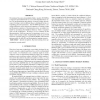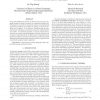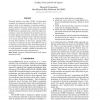89 search results - page 6 / 18 » Discriminative semi-parametric trajectory model for speech r... |
ICASSP
2011
IEEE
12 years 11 months ago
2011
IEEE
We introduce Bayesian sensing hidden Markov models (BS-HMMs) to represent speech data based on a set of state-dependent basis vectors. By incorporating the prior density of sensin...
ICASSP
2010
IEEE
13 years 7 months ago
2010
IEEE
This paper addresses the problem of discriminative training of language models that does not require any transcribed acoustic data. We propose to minimize the conditional entropy ...
TASLP
2008
13 years 7 months ago
2008
Abstract--This paper is concerned with the automatic recognition of dialogue acts (DAs) in multiparty conversational speech. We present a joint generative model for DA recognition ...
EXPERT
2010
13 years 4 months ago
2010
Human behavior recognition is one of the most important and challenging objectives performed by intelligent vision systems. Several issues must be faced in this domain ranging fro...
INTERSPEECH
2010
13 years 2 months ago
2010
This paper describes a new toolkit - SCARF - for doing speech recognition with segmental conditional random fields. It is designed to allow for the integration of numerous, possib...



